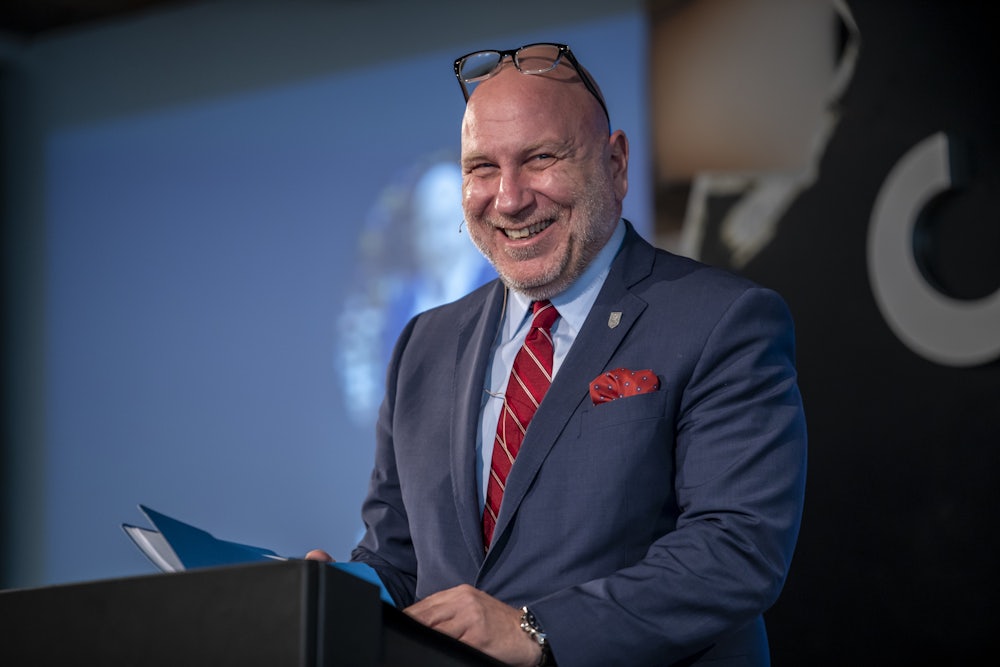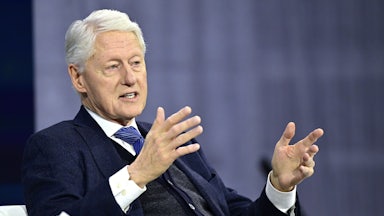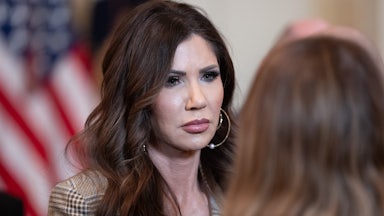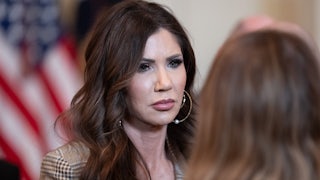It’s being hailed as the latest, greatest front in the campus free speech wars: Across the United States, student demonstrations have erupted on countless college campuses in the months since a Hamas attack on a music festival in Israel led to more than 1,000 deaths and months of escalating siege on the Gaza Strip, which have added nearly 30,000 Palestinian casualties to the grim tally. One such protest unfolded less than two weeks after the initial attack, during a question and answer session about the conflict hosted by the Political Science Department at the University of Texas at Arlington, or UTA.
According to UTA’s student newspaper, The Shorthorn, more than 100 students, many of whom expressed support for Palestine, attended the on-campus event. The department’s chair, Morgan Marietta, introduced the topic using President Joe Biden’s summary of the situation and referred to Hamas as a “terrorist organization.” Throughout the discussion, tensions escalated into shouting and cursing. Students were escorted from the room, where their protest merged with a scheduled demonstration outside.
Events spiraling in this fashion led leadership at UTA’s College of Liberal Arts to issue new guidance, requiring event planners to submit their proposals to the dean seven days in advance for approval—alongside a risk assessment, a risk mitigation plan, and a copy of any prepared comments. The day after he received this email, Marietta resigned his chairmanship. He later described the guidance as “cowardly” and “a transparent attempt to dissuade faculty from speaking on controversial topics,” in an op-ed about his resignation. He didn’t remain on staff at UTA much longer.
“It was the last straw,” Marietta told The New Republic. “I had been hopeful for some time that universities would reform and we could make progress toward improving problems on campus [but the October 7 attacks] revealed a lot of the festering problems. I no longer had any faith that it would get better.”
Marietta has bounced back, however. Since leaving UTA, he has become one of the latest faculty members at a new institution where stoking academic controversy is practically a job requirement. At the University of Austin, or UATX, which has been dubbed the “anti-woke” university, it’s a badge they wear proudly—and never more so than now that UATX is seemingly on the road to acquiring some form of legitimacy.
Long thought to be a pipe dream of its founders, UATX plans to enroll its first class of 100 students in fall 2024. Although it still faces a long road to accreditation, UATX is approved to grant Bachelor’s Degrees by the state of Texas and says its class credits will be accepted by partnering postgraduate programs. (The state’s higher education coordinating board doesn’t gatekeep the word “university,” leaving it in the eye of the beholder.)* Each member of the inaugural class, whom UATX—following the past two-decade trend of trying to shoehorn old ideas into the culture of Silicon Valley—refers to as “Founders,” will receive approximately $130,000 to cover the cost of tuition for four years. This past weekend, prospective students and alumni from its provocatively named “Forbidden Courses” series gathered at UATX’s downtown campus to hear from faculty, staff, and a roster of speakers.
Throughout the weekend, awkward teens shuffled through a familiar procession of campus tour activities. They attended lectures, toured housing, and made conversation over hot tea and diet soda. The campus, currently located in a single downtown building within eyeshot of the state Capitol, fits the mold of a city university in miniature. But aside from the lack of alcohol, the kickoff mixer felt more like a lobbying event than a college information session. About half the attendees were adults. Speakers indulged in a bit more grandstanding than your average, eager college deans are wont to do. Several prospective parents and students said they were less interested in club sports, extracurriculars, or off-campus house parties than they were excited about the potential for high-profile connections and the school’s emphasis on freedom of speech.
Those who have declared themselves true believers in the UATX cause are hopeful that by providing a space for what they term to be “open inquiry and civil discourse,” they will spur change across the current higher education landscape—which to their estimation is incompatible with the pursuit of truth and knowledge. But it’s unclear whether UATX is really on track to spark some broad movement or merely to be the latest flash in a reactionary pan—a Substack trending topic with a physical address.
If you take its brand marketing at face value, UATX is above the simple-mindedness of Twitter feuds, childish trolling, and the fervent religiosity of the Very Online. In practice, however, it’s something of a retread, aligned with a familiar strand of libertarianism that already comes in a pre-congealed, ready-to-digest form in the public utterances of (fellow Austinites) Joe Rogan and Elon Musk. It’s a politics that courts a sort of edgelord conservatism while casting itself as the only true seeker of freedom. The ultimate product is merely fresh grist for the same old culture-war content mills—more fuel for the fire of right-leaning causes.
For all the hype, UATX doesn’t really differentiate itself from many other ideas getting half-baked in the Lone Star State sun. If anything, UATX is a Johnny-come-lately in a burgeoning field of “anti-woke” educational projects. Late in 2023, West Texas A&M University (located in Canyon, Texas, far from Austin, in the state’s Panhandle) announced it would use a $20 million donation to open a new center on campus devoted to the freedom of expression through faith, family, and patriotism—among other so-called “Panhandle Values.” The Hill Institute will be named after one of the university’s earliest presidents, Joseph Hill, who believed in the “importance of Judeo-Christian values.”
In 2021, Republican megadonors and high-ranking lawmakers in the state GOP called for a similar project at the University of Texas at Austin, the state’s flagship public university. Initial proposals for the Civitas Institute, as it’s now known, called for a space committed to “intellectual diversity” in addition to “individual liberty, limited government, private enterprise and free markets.”
The statewide pushback on wokeism and progressive politics in higher education echoes calls to fight against the “indoctrination” of K-12 students in Texas (and across the country) by offering state dollars for students to opt out of public schools and attend private schools instead—although a legislative effort championed by Patrick and Governor Greg Abbott to pass such legislation vouchers failed just months ago.
Multiple studies confirm the majority of Americans, regardless of political affiliation, agree that “cancel culture” is a threat to society. The problem is that no one seems to agree on what actually constitutes “being canceled,” who is being victimized, or where society should draw the line on “cancelable” offenses. Cancel culture, in the way that it’s been popularly depicted on Fox News or AM radio stations, seems to only apply to one category of victim. To stereotype—in the way a UATX professor might say is a legitimate expression of my First Amendment rights—it’s exactly the type of person who attended the school’s open house weekend.
The crowd of young attendees were mostly (but not all) white, male, brown-haired, blue-eyed, and dressed in a uniform of button-downs and khakis. You can imagine them calling themselves “contrarians” and that they like to play devil’s advocate in their free time. Marietta confirmed the majority of UATX’s incoming class, alongside its incoming staff, will consist of conservatives and libertarians, “because they’re the ones having difficulty on campus.” He claims, however, that this isn’t the ultimate design. “If you just have a bunch of conservative students repeating each other, they don’t know if they’re right or wrong. We have to have the debate and the challenge.” He’s hopeful that UATX can recruit more mainstream liberals to prevent UATX from becoming the echo chamber that’s been erected at its founding.
It’s far from clear whether young, self-styled progressive students of the sort who have organized, or even merely attended, the most recent campus protests truly have a place in the allegedly open dialogue that UATX supports. On the matter of the Israel-Palestine conflict, evidence suggests that UATX would characterize a lack of fealty to Israel’s cause as unacceptable wrongthink.
Keri Waters, a staff member at UATX who is leading the school’s Office of Entrepreneurship and Leadership, vouched for the university’s commitment to seeking out viewpoints, saying that some staff members (although not the high-profile ones) even hold anti-Zionist views. She has a son applying to be part of the school’s first class of students later this year, and has historically identified as left-leaning. “I’m Gen X, and I remember back in the day I was a proud member of the ACLU. Free speech was very much a value that was held on the left,” she said. “Now I don’t know what left and right mean any more.” She’s excited for an upcoming UATX-sponsored SXSW talk by writer-illustrator Tim Urban. In his book What’s Our Problem? A Self-Help Book for Societies, Urban uses a ladder as a metaphor for intellectual sophistication. Higher rungs represent practices like philosophy and the scientific method, while the lower rungs stand for identity politics and mudslinging. “We want to be high-rung U,” Waters said.
But the university seems to contradict this stated commitment in the distinctly homogenous viewpoints promulgated by its best-known figureheads. In an entry posted to the UATX Facebook page in November, visitors were directed to an article by Jacob Howland, a philosopher and faculty member. In “The Genocidal Logic of American Ideology,” he writes about antisemitism as a result of the ongoing Israel-Palestine conflict and mentions a documented rise in hate crimes against Jews since the October 7 attack. He fails to give any consideration to the corresponding rise in hate crimes against American Muslims or the destruction that’s been wrought in the blockade and bombing of Gaza.
It’s possible that these are forbidden topics: Bari Weiss, UATX’s most high-profile co-founder—who is perhaps best known for “her involvement in numerous campaigns to vilify and ruin the careers of several Arab and Muslim professors” at Columbia University—describes herself as a Zionist, and has used similar rhetoric on this issue.
During the UATX open house weekend, Michael Schellenberger gave a presentation on empiricism to prospective students. He recalled an argument he had with a friend last summer about Donald Trump, in which he disagreed that misinformation is a bigger problem than censorship. “Misinformation reifies something that is subjective,” he tells the crowd.
But what if it doesn’t? Sometimes misinformation is just a lie. What happens when something objectively untrue is permitted to become a legitimate side in a debate? What kind of discourse is possible when you’ve only made room for one ideological viewpoint? What happens when abundance of dogma obstructs what lies in front of our very eyes? The University of Austin is about to spend millions of dollars to find out.
* This article originally mischaracterized the path to accreditation.










